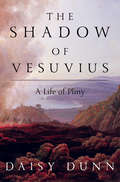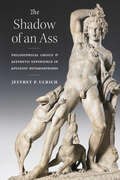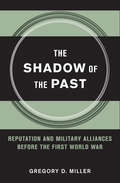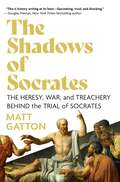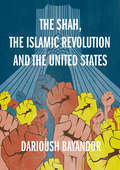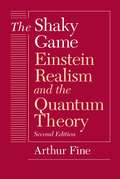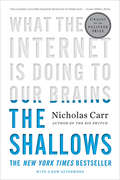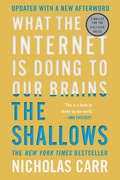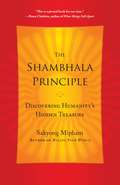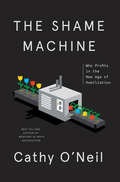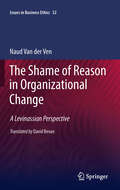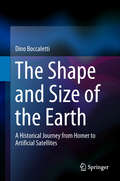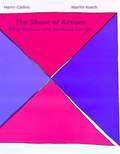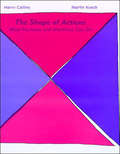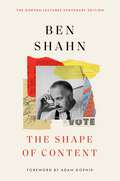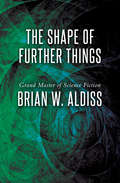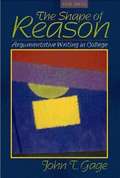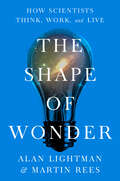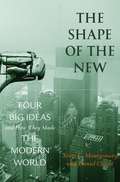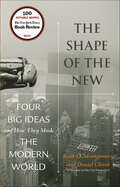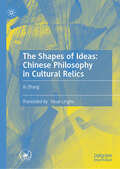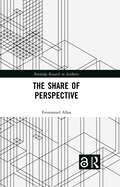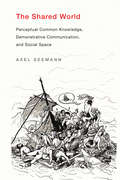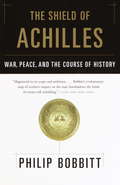- Table View
- List View
The Shadow of Vesuvius: A Life Of Pliny
by Daisy Dunn“A wonderfully rich, witty, insightful, and wide-ranging portrait of the two Plinys and their world.”—Sarah Bakewell, author of How to Live When Pliny the Elder perished at Stabiae during the eruption of Vesuvius in 79 AD, he left behind an enormous compendium of knowledge, his thirty-seven-volume Natural History, and a teenaged nephew who revered him as a father. Grieving his loss, Pliny the Younger inherited the Elder’s notebooks—filled with pearls of wisdom—and his legacy. At its heart, The Shadow of Vesuvius is a literary biography of the younger man, who would grow up to become a lawyer, senator, poet, collector of villas, and chronicler of the Roman Empire from the dire days of terror under Emperor Domitian to the gentler times of Emperor Trajan. A biography that will appeal to lovers of Mary Beard books, it is also a moving narrative about the profound influence of a father figure on his adopted son. Interweaving the younger Pliny’s Letters with extracts from the Elder’s Natural History, Daisy Dunn paints a vivid, compellingly readable portrait of two of antiquity’s greatest minds.
The Shadow of an Ass: Philosophical Choice and Aesthetic Experience in Apuleius' Metamorphoses
by Jeffrey P. UlrichJeffrey Ulrich’s The Shadow of an Ass addresses fundamental questions about the reception and aesthetic experience of Apuleius’ Metamorphoses, popularly known as The Golden Ass, by situating the novel in a contemporaneous literary and philosophical discourse emerging in the Second Sophistic. This unique Latin novel follows a man who is accidentally turned into a donkey because of his curiosity, viewing the world through a donkey’s eyes until he is returned to human form by the Egyptian goddess Isis. In the end, he chooses to become a cult initiate and priest instead of a debased and overindulgent ass. On the one hand, the novel encourages readers to take pleasure in the narrator’s experiences, as he relishes food, sex, and forbidden forms of knowledge. Simultaneously, it challenges readers to reconsider their participation in the story by exposing its donkey-narrator as a failed model of heroism and philosophical investigation. Ulrich interprets the Metamorphoses as a locus of philosophical inquiry, positioning the act of reading as a choice of how much to invest in this tale of pleasurable transformation and unanticipated conversion. The Shadow of an Ass further explores how Apuleius, as a North African philosopher translating an originally Greek novel into a Latin idiolect, transforms himself into an intermediary of Platonic philosophy for his Carthaginian audience. Situating the novel in a long history of philosophical and literary conversations, Ulrich suggests that the Metamorphoses anticipates much of the philosophical burlesque we tend to associate with early modern fiction, from Don Quixote to Lewis Carroll.
The Shadow of the Past: Reputation and Military Alliances before the First World War (Cornell Studies in Security Affairs)
by Gregory D. MillerIn The Shadow of the Past, Gregory D. Miller examines the role that reputation plays in international politics, emphasizing the importance of reliability—confidence that, based on past political actions, a country will make good on its promises—in the formation of military alliances. Challenging recent scholarship that focuses on the importance of credibility—a state’s reputation for following through on its threats—Miller finds that reliable states have much greater freedom in forming alliances than those that invest resources in building military force but then use it inconsistently. To explore the formation and maintenance of alliances based on reputation, Miller draws on insights from both political science and business theory to track the evolution of great power relations before the First World War. He starts with the British decision to abandon "splendid isolation" in 1900 and examines three crises—the First Moroccan Crisis (1905–6), the Bosnia-Herzegovina Crisis (1908–9), and the Agadir Crisis (1911)—leading up to the war. He determines that states with a reputation for being a reliable ally have an easier time finding other reliable allies, and have greater autonomy within their alliances, than do states with a reputation for unreliability. Further, a history of reliability carries long-term benefits, as states tend not to lose allies even when their reputation declines.
The Shadows of Socrates: The Heresy, War, and Treachery Behind the Trial of Socrates
by Matt GattonThe death of Socrates may be the most famous unsolved murder in history. Set during the Peloponnesian War, this narrative solves that mystery, revealing for the first time how the philosopher was set up, who did it, and why.The influence of the ancient Greek philosopher Socrates has been profound. Even today, over two thousand years after his death, he remains one of the most renowned humans to have ever lived, occupying a stratum with the likes of Buddha, Jesus, Muhammed, Confucius, and Moses. It may not be too much to say that Socrates is the single most recognizable name in the history of all humanity. The death of Socrates is, in some ways, the most famous unsolved murder mystery in history. This book will solve the mystery, revealing for the first time how he was set up, who did it, and why. What follows is not a philosophical tract but something closer to a novel—made all the more compelling because it&’s true. This is a real-life whodunit intertwined with a long running war, rivalry, sex addiction, betrayal, sedition, starvation, and epic bravery. Socrates was the most rational of men living in the most irrational of times. There is another side to this story: impiety, lack of reverence for the gods, was a religious crime. From the perspective of the religious authorities of the time, the charge of impiety against Socrates was warranted, his trial just, and the penalty appropriate. The priests did not tolerate scrutiny, even in the form of philosophical critique. To understand what happened and how it happened, we have to come to terms with the motives of the priests, and as importantly, Socrates&’ motives in provoking them. His trial is perhaps first, but not last, great battle between philosophy and religion. The repercussions of this ancient epic apply equally to the West today, as Athens also endured pendulum swings between democracy and oligarchy—always with bloodshed, and never with Socrates&’s approval.
The Shah, the Islamic Revolution and the United States
by Darioush BayandorThe Islamic Revolution in 1979 transformed Iranian society and reshaped the political landscape of the Middle East. Four decades later, Darioush Bayandor draws upon heretofore untapped archival evidence to reexamine the complex domestic and international dynamics that led to the Revolution. Beginning with the socioeconomic transformation of the 1960s, this book follows the Shah’s rule through the 1970s, tracing the emergence of opposition movements, the Shah’s blunders and miscalculations, the influence of the post-Vietnam zeitgeist and the role of the Carter administration. The Shah, the Islamic Revolution and the United States offers new revelations about how Iran was thrown into chaos and an ailing ruler lost control, with consequences that still reverberate today.
The Shaky Game: Einstein Realisn and the Quantum Theory
by Arthur FineIn this new edition, Arthur Fine looks at Einstein's philosophy of science and develops his own views on realism. A new Afterword discusses the reaction to Fine's own theory. "What really led Einstein . . . to renounce the new quantum order? For those interested in this question, this book is compulsory reading."—Harvey R. Brown, American Journal of Physics "Fine has successfully combined a historical account of Einstein's philosophical views on quantum mechanics and a discussion of some of the philosophical problems associated with the interpretation of quantum theory with a discussion of some of the contemporary questions concerning realism and antirealism. . . . Clear, thoughtful, [and] well-written."—Allan Franklin, Annals of Science "Attempts, from Einstein's published works and unpublished correspondence, to piece together a coherent picture of 'Einstein realism.' Especially illuminating are the letters between Einstein and fellow realist Schrödinger, as the latter was composing his famous 'Schrödinger-Cat' paper."—Nick Herbert, New Scientist "Beautifully clear. . . . Fine's analysis is penetrating, his own results original and important. . . . The book is a splendid combination of new ways to think about quantum mechanics, about realism, and about Einstein's views of both."—Nancy Cartwright, Isis
The Shallows: What The Internet Is Doing To Our Brains
by Nicholas CarrFinalist for the 2011 Pulitzer Prize in General Nonfiction: “Nicholas Carr has written a Silent Spring for the literary mind.”—Michael Agger, Slate “Is Google making us stupid?” When Nicholas Carr posed that question, in a celebrated Atlantic Monthly cover story, he tapped into a well of anxiety about how the Internet is changing us. He also crystallized one of the most important debates of our time: As we enjoy the Net’s bounties, are we sacrificing our ability to read and think deeply? Now, Carr expands his argument into the most compelling exploration of the Internet’s intellectual and cultural consequences yet published. As he describes how human thought has been shaped through the centuries by “tools of the mind”—from the alphabet to maps, to the printing press, the clock, and the computer—Carr interweaves a fascinating account of recent discoveries in neuroscience by such pioneers as Michael Merzenich and Eric Kandel. Our brains, the historical and scientific evidence reveals, change in response to our experiences. The technologies we use to find, store, and share information can literally reroute our neural pathways. Building on the insights of thinkers from Plato to McLuhan, Carr makes a convincing case that every information technology carries an intellectual ethic—a set of assumptions about the nature of knowledge and intelligence. He explains how the printed book served to focus our attention, promoting deep and creative thought. In stark contrast, the Internet encourages the rapid, distracted sampling of small bits of information from many sources. Its ethic is that of the industrialist, an ethic of speed and efficiency, of optimized production and consumption—and now the Net is remaking us in its own image. We are becoming ever more adept at scanning and skimming, but what we are losing is our capacity for concentration, contemplation, and reflection. Part intellectual history, part popular science, and part cultural criticism, The Shallows sparkles with memorable vignettes—Friedrich Nietzsche wrestling with a typewriter, Sigmund Freud dissecting the brains of sea creatures, Nathaniel Hawthorne contemplating the thunderous approach of a steam locomotive—even as it plumbs profound questions about the state of our modern psyche. This is a book that will forever alter the way we think about media and our minds.
The Shallows: What The Internet Is Doing To Our Brains
by Nicholas CarrNew York Times bestseller • Finalist for the Pulitzer Prize “This is a book to shake up the world.” —Ann Patchett Nicholas Carr’s bestseller The Shallows has become a foundational book in one of the most important debates of our time: As we enjoy the internet’s bounties, are we sacrificing our ability to read and think deeply? This 10th-anniversary edition includes a new afterword that brings the story up to date, with a deep examination of the cognitive and behavioral effects of smartphones and social media.
The Shambhala Principle: Discovering Humanity's Hidden Treasure
by Sakyong MiphamOne of Tibet's highest and most respected lamas elucidates for us the principles of Shambhala, or the path to happiness, set down by his legendary father, Chögyam Trungpa Rinpoche.Dear Reader, We humans have come to a crossroads in our history: we can either destroy the world or create a good future. The Shambhala Principle offers the principle of basic goodness as a way of addressing the personal and social challenges that we face. Do we, as humans, have confidence in the basic goodness of humanity, as well as of society itself? As a Tibetan lama and spiritual leader, this strikes me as our most compelling global issue. The book revolves around a dialogue with my father, the legendary Chögyam Trungpa. Whether his responses were direct or mystical, he continuously returned to the topics of basic goodness and enlightened society. Not only did he show me how I could become confident in their existence through awareness and meditation, he also taught me how basic goodness is a socially viable standard that could stabilize and transform our world.However, this book is not a memoir, or even a message. It is an invitation to readers to reflect on their own basic goodness and the basic goodness of society, and then contemplate the question, Can we rouse our energy and confidence to create a good world that is founded on this principle? I encourage you to join me in this contemplation. --Sakyong Mipham
The Shame Machine: Who Profits in the New Age of Humiliation
by Cathy O'NeilA clear-eyed warning about the increasingly destructive influence of America&’s &“shame industrial complex&” in the age of social media and hyperpartisan politics—from the New York Times bestselling author of Weapons of Math Destruction&“O&’Neil reminds us that we must resist the urge to judge, belittle, and oversimplify, and instead allow always for complexity and lead always with empathy.&”—Dave Eggers, author of The EveryShame is a powerful and sometimes useful tool: When we publicly shame corrupt politicians, abusive celebrities, or predatory corporations, we reinforce values of fairness and justice. But as Cathy O&’Neil argues in this revelatory book, shaming has taken a new and dangerous turn. It is increasingly being weaponized—used as a way to shift responsibility for social problems from institutions to individuals. Shaming children for not being able to afford school lunches or adults for not being able to find work lets us off the hook as a society. After all, why pay higher taxes to fund programs for people who are fundamentally unworthy? O&’Neil explores the machinery behind all this shame, showing how governments, corporations, and the healthcare system capitalize on it. There are damning stories of rehab clinics, reentry programs, drug and diet companies, and social media platforms—all of which profit from &“punching down&” on the vulnerable. Woven throughout The Shame Machine is the story of O&’Neil&’s own struggle with body image and her recent weight-loss surgery, which awakened her to the systematic shaming of fat people seeking medical care.With clarity and nuance, O&’Neil dissects the relationship between shame and power. Whom does the system serve? Is it counter-productive to call out racists, misogynists, and vaccine skeptics? If so, when should someone be &“canceled&”? How do current incentive structures perpetuate the shaming cycle? And, most important, how can we all fight back?
The Shame of Reason in Organizational Change: A Levinassian Perspective
by David Bevan Naud van der VenRational thought according to Levinas has the merit of making the world lucid and controllable. But at the same time it strips things and people of their identity and incorporates them in a homogenized rational order. Illusory, but nonetheless oppressive. Rationality's totalitarian character can provoke resistance and grief with people who are enlisted by it. This can lead to a shameful confrontation in which the thinker is being confronted with his victim's resistance and sees himself and his thinking made questionable. By proceeding along this route, thinking can be brought to self-criticism and to revision of standpoints. This description by Levinas of rational thinking shows similarity to what managers do in organizations. They make their business controllable, but at the same time with their planning and schemes they create a totalitarian straitjacket. This similarity suggests that also the reactions to imperialistic rationality from Levinas' description ought to be found in organizations. Is it indeed possible to indicate there the kind of resistance and grief Levinas speaks about? Does that give rise to confrontations between managers and their co-workers who are supposed to subordinate to their schemes? Do managers then feel shame? And do those shameful confrontations consequently lead to self-reflection and change? Desk research suggests that the above elements are partly to be found in the literature of management theory. Interviews with managers show that Levinas' line of thought can also be found in its completeness within organizations. At the same time it becomes clear that becoming conscious of the elements of that line of thought - that rationality is all-conquering, that it provokes resistance, that that can lead to shame as well as to a new beginning - this is a difficult path to travel. The related experiences are easily forgotten and sometimes difficult to excavate. Translation of Levinas' thinking into terms of management and organization can help us spot them where they play their role in organizations.
The Shape and Size of the Earth: A Historical Journey from Homer to Artificial Satellites
by Dino BoccalettiThis book describes in detail the various theories on the shape of the Earth from classical antiquity to the present day and examines how measurements of its form and dimensions have evolved throughout this period. The origins of the notion of the sphericity of the Earth are explained, dating back to Eratosthenes and beyond, and detailed attention is paid to the struggle to establish key discoveries as part of the cultural heritage of humanity. In this context, the roles played by the Catholic Church and the philosophers of the Middle Ages are scrutinized. Later contributions by such luminaries as Richer, Newton, Clairaut, Maupertuis, and Delambre are thoroughly reviewed, with exploration of the importance of mathematics in their geodetic enterprises. The culmination of progress in scientific research is the recognition that the reference figure is not a sphere but rather a geoid and that the earth’s shape is oblate. Today, satellite geodesy permits the solution of geodetic problems by means of precise measurements. Narrating this fascinating story from the very beginning not only casts light on our emerging understanding of the figure of the Earth but also offers profound insights into the broader evolution of human thought.
The Shape of Actions
by Harry CollinsWhat can humans do? What can machines do? How do humans delegate actions to machines? In this book, Harry Collins and Martin Kusch combine insights from sociology and philosophy to provide a novel answer to these increasingly important questions. The authors begin by distinguishing between two basic types of intentional behavior, which they call polimorphic actions and mimeomorphicb actions. Polimorphic actions (such as writing a love letter) are ones that community members expect to vary with social context. Mimeomorphic actions (such a swinging a golf club) do not vary. Although machines cannot act, they can mimic mimeomorphic actions. Mimeomorphic actions are thus the crucial link between what humans can do and what machines can do. Following a presentation of their detailed categorization of actions, the authors apply their approach to a broad range of human-machine interactions and to learning. Key examples include bicycle riding and the many varieties of writing machines. They also show how their theory can be used to explain the operation of organizations such as restaurants and armies. Finally, they look at a historical case&--the technological development of the air pump&--applying their categorization of actions to the processes of mechanization and automation. Automation, they argue, can occur only where what we want to bring about can be brought about through mimeomorphic action.
The Shape of Actions: What Humans and Machines Can Do
by Harry Collins Martin KuschWhat can humans do? What can machines do? How do humans delegate actions to machines? In this book, Harry Collins and Martin Kusch combine insights from sociology and philosophy to provide a novel answer to these increasingly important questions. The authors begin by distinguishing between two basic types of intentional behavior, which they call polimorphic actions and mimeomorphic actions. Polimorphic actions (such as writing a love letter) are ones that community members expect to vary with social context. Mimeomorphic actions (such a swinging a golf club) do not vary. Although machines cannot act, they can mimic mimeomorphic actions. Mimeomorphic actions are thus the crucial link between what humans can do and what machines can do.Following a presentation of their detailed categorization of actions, the authors apply their approach to a broad range of human-machine interactions and to learning. Key examples include bicycle riding and the many varieties of writing machines. They also show how their theory can be used to explain the operation of organizations such as restaurants and armies. Finally, they look at a historical case—the technological development of the air pump—applying their categorization of actions to the processes of mechanization and automation. Automation, they argue, can occur only where what we want to bring about can be brought about through mimeomorphic action.
The Shape of Content (The Charles Eliot Norton lectures)
by Ben Shahn“The clearest, most forceful statement on art by an artist of our time that I have read.” —Frank Getlein, New RepublicAn illustrated guide to artistic creation from one of the twentieth century’s most provocative and expressive painters.Can art be taught? For the celebrated activist-painter Ben Shahn, the answer was a qualified yes. Any would-be artist can take a few courses and dip their toes in the water. But a true education goes far beyond the classroom.The Shape of Content, compiled from Shahn’s 1956–1957 Norton Lectures, appeals for artists to break the confines of formal instruction. In wide-ranging reflections on art history, the problems of form, and his own career, Shahn conveys the stubborn determination required to move beyond dilettantism and toward an authentic voice. But he delivers no easy formulas. Critics celebrate artists’ seemingly effortless moments of inspiration, yet genuine achievement is always the fruit of prodigious labor. To the perennial questions of “What shall I paint?” and “How shall I paint it?” Shahn replies: Live and think and try. Read endlessly, develop and test opinions, and above all, don’t stop painting.A figurative realist in an age of high abstraction and an unabashed leftist at the height of the Cold War, Shahn was never quite at home in his own time. The accessibility and popularity of his work, and his sometimes-unfashionable humanism, made him a frequent target of critics during his life. And yet it is precisely these features that have since cemented Shahn as a giant of twentieth-century art. Today, his lectures offer potent lessons for anyone who shares his belief in the power of art to change minds and contest injustice.
The Shape of Further Things
by Brian W. AldissThe sci-fi author behind Steven Spielberg&’s A.I. shares his thoughts on the present, the future, and his own work and life. &“We are infinitely rich, yet we mess about with penny-in-the-slot machines,&” writes Brian W. Aldiss in this autobiographical work written over the course of one month. From his Oxfordshire home, he ruminates on dreams, education, the role of technology in our lives, the rise and function of science fiction, and a variety of other topics. The Shape of Further Things is a window into the life and mind of a Science Fiction Grand Master. Winner of two Hugo Awards, one Nebula Award, and named a Grand Master by the Science Fiction Writers of America, Brian W. Aldiss challenged readers&’ minds for over fifty years with literate, thought-provoking, and inventive science fiction. &“This short book flows with large ideas, a time capsule now from the grandest of writers.&” —SF Site
The Shape of Reason: Argumentative Writing in College
by John T. GageArgumentative reasoning addresses ideas that the writer takes seriously enough to want to explore and support with good reasons.
The Shape of Wonder: How Scientists Think, Work, and Live
by Alan Lightman Martin ReesIn this captivating, insightful book, acclaimed physicists Alan Lightman and Martin Rees illuminate the life and work of numerous scientists in order to demystify the scientific process and show that scientists are concerned citizens, just like the rest of us.&“Remarkable. . . . Illuminating with refreshing clarity the ordinary and sometimes extraordinary work of scientists. This book is essential reading." —Jennifer Ackerman, bestselling author of What an Owl KnowsIn an age of rapid scientific discovery and technological advancement, it&’s understandable that many feel uneasy about the future. While we might have confidence in these new developments when we go to the hospital for a medical procedure, fly in an airplane, or take an elevator to the top floor of a building, the motivations and lives of scientists themselves feel shrouded from public view. There is a growing sense that scientists are not to be trusted—that they may be guided by political or financial interests, or beholden to governments, or state institutions.This growing mistrust of scientists is an urgent problem. With the onset of climate change, the imminent threats of pandemic or nuclear war, and rapid acceleration in the fields of artificial intelligence and DNA sequencing, innovations in science have the potential to change the world. It&’s crucial that we not only gain a better understanding of science as a field, but also reestablish trust with its practitioners.The Shape of Wonder guides us through the fascinating lives and minds of scientists around the world and throughout time, from a young theoretical physicist who works as a research assistant professor at the University of Washington and rock climbs in their free time; to German physicist Werner Heisenberg in his early life, when he was a student of music and philosophy; to Govind Swarup, an Indian astronomer whose work on radio telescopes was profoundly important. We get an inside peek at what makes scientists tick—their daily lives, passions, and concerns about the societies they live in.In this brilliant and elucidative work, Lightman and Rees pull back the curtain on the field of science, revealing that scientists are driven by the same sense of curiosity, wonder, and responsibility towards the future that shapes us all.
The Shape of the New
by Daniel Chirot Scott L. MontgomeryThis panoramic book tells the story of how revolutionary ideas from the Enlightenment about freedom, equality, evolution, and democracy have reverberated through modern history and shaped the world as we know it today.A testament to the enduring power of ideas, The Shape of the New offers unforgettable portraits of Adam Smith, Thomas Jefferson, Alexander Hamilton, Charles Darwin, and Karl Marx--heirs of the Enlightenment who embodied its highest ideals about progress--and shows how their thoughts, over time and in the hands of their followers and opponents, transformed the very nature of our beliefs, institutions, economies, and politics. Yet these ideas also hold contradictions. They have been used in the service of brutal systems such as slavery and colonialism, been appropriated and twisted by monsters like Stalin and Hitler, and provoked reactions against the Enlightenment's legacy by Islamic Salafists and the Christian Religious Right.The Shape of the New argues that it is impossible to understand the ideological and political conflicts of our own time without familiarizing ourselves with the history and internal tensions of these world-changing ideas. With passion and conviction, it exhorts us to recognize the central importance of these ideas as historical forces and pillars of the Western humanistic tradition. It makes the case that to read the works of the great thinkers is to gain invaluable insights into the ideas that have shaped how we think and what we believe.
The Shape of the New: Four Big Ideas and How They Made the Modern World
by Daniel Chirot Scott L. MontgomeryHow four revolutionary ideas from the Enlightenment shaped today's worldThis panoramic book tells the story of how revolutionary ideas from the Enlightenment about freedom, equality, evolution, and democracy have reverberated through modern history and shaped the world as we know it today.A testament to the enduring power of ideas, The Shape of the New offers unforgettable portraits of Adam Smith, Thomas Jefferson, Alexander Hamilton, Charles Darwin, and Karl Marx—heirs of the Enlightenment who embodied its highest ideals about progress—and shows how their thoughts, over time and in the hands of their followers and opponents, transformed the very nature of our beliefs, institutions, economies, and politics. Yet these ideas also hold contradictions. They have been used in the service of brutal systems such as slavery and colonialism, been appropriated and twisted by monsters like Stalin and Hitler, and provoked reactions against the Enlightenment's legacy by Islamic Salafists and the Christian Religious Right.The Shape of the New argues that it is impossible to understand the ideological and political conflicts of our own time without familiarizing ourselves with the history and internal tensions of these world-changing ideas. With passion and conviction, it exhorts us to recognize the central importance of these ideas as historical forces and pillars of the Western humanistic tradition. It makes the case that to read the works of the great thinkers is to gain invaluable insights into the ideas that have shaped how we think and what we believe.
The Shapes of Ideas: Chinese Philosophy in Cultural Relics
by Xi ZhangThe book combines Chinese philosophy and historical knowledge and delivers the core ideas of Chinese philosophy from 72 elaborately selected pieces of cultural relics in 18 topics. Based on the structure of “Cosmology-Ontology-Theory of Mind-Nature” for ancient Chinese philosophy, the author probes the new achievements in recent years, and portrays the Chinese world of thought for its vivid transformation from pre-philosophical period to early modern period, from elitism taste to popularized orientation. By narrating the nature of being, the author brings the thought essence of ancient Chinese philosophy to the readers, meanwhile mentions the society and history, and therefore sketches the interaction among the three objects. The book elucidates the wisdom of Chinese philosophy contained in cultural relics and reveals the thought and exploration of ancient Chinese sages to the secrets of human nature.
The Share of Perspective (Routledge Research in Aesthetics)
by Emmanuel AlloaThis book is a defense of perspectivism in the age of post-truth. At the crossroads of science, art, and philosophy, it unearths a tradition that we must rediscover: the point of view is not only what divides, it is also what is shared.Today, perspective is associated with individualism and personal viewpoints. But in an age of post-truth, the only robust answer to relativism lies in fact in a reappraisal of perspectivism. In discussion with contemporary new realisms of various sorts, this book makes a case why perspectivism alone can avoid us falling back into epistemological naivetés. A journey into the history of optics, art, philosophy, and social psychology, this book unearths the forgotten tradition of perspectiva communis, which makes perspective the vector of a common horizon. This book argues that vision is never immediate. Rather, to see through is the key to understanding the perspectival operation. We never see by ourselves—all seeing must pass through something other than itself, through the mediation and the detour of an apparatus or the witness of a third party. Besides the theoretical framework for this new approach to perspective, this book presents a series of case studies ranging from innovative interpretations of classical authors and key moments in the history of art—from ancient painting, trompe l’oeil, and Brunelleschi’s experiment in Renaissance Florence—to the issue of perspective in the work of contemporary artists such as Robert Smithson.The Share of Perspective will be of interest to scholars and advanced students working in aesthetics, phenomenology, art history, and the history of sciences.
The Shared World: Perceptual Common Knowledge, Demonstrative Communication, and Social Space (The\mit Press Ser.)
by Axel SeemannA novel treatment of the capacity for shared attention, joint action, and perceptual common knowledge.In The Shared World, Axel Seemann offers a new treatment of the capacity to perceive, act on, and know about the world together with others. Seemann argues that creatures capable of joint attention stand in a unique perceptual and epistemic relation to their surroundings; they operate in an environment that they, through their communication with their fellow perceivers, help constitute. Seemann shows that this relation can be marshaled to address a range of questions about the social aspect of the mind and its perceptual and cognitive capacities.Seemann begins with a conceptual question about a complex kind of sociocognitive phenomenon—perceptual common knowledge—and develops an empirically informed account of the spatial structure of the environment in and about which such knowledge is possible. In the course of his argument, he addresses such topics as demonstrative reference in communication, common knowledge about jointly perceived objects, and spatial awareness in joint perception and action.
The Shield of Achilles
by Philip Bobbitt"We are at a moment in world affairs when the essential ideas that govern statecraft must change. For five centuries it has taken the resources of a state to destroy another state . . . This is no longer true, owing to advances in international telecommunications, rapid computation, and weapons of mass destruction. The change in statecraft that will accompany these developments will be as profound as any that the State has thus far undergone."--from the PrologueThe Shield of Achilles is a classic inquiry into the nature of the State, its origin in war, and its drive for peace and legitimacy. Philip Bobbitt, a professor of constitutional law and a historian of nuclear strategy, has served in the White House, the Senate, the State Department, and the National Security Council in both Democratic and Republican administrations, and here he brings his formidable experience and analytical gifts to bear on our changing world. Many have observed that the nation-state is dying, yet others have noted that the power of the State has never been greater. Bobbitt reconciles this paradox and introduces the idea of the market-state, which is already replacing its predecessor. Along the way he treats such themes as the Long War (which began in 1914 and ended in 1990). He explains the relation of violence to legitimacy, and the role of key individuals in fates that are partially--but only partially--determined.This book anticipates the coalitional war against terrorism and lays out alternative futures for the world. Bobbitt shows how nations might avoid the great power confrontations that have a potential for limitless destruction, and he traces the origin and evolution of the State to such wars and the peace conferences that forged their outcomes into law, from Augsburg to Westphalia to Utrecht to Vienna to Versailles.The author paints a powerful portrait of the ever-changing interrelatedness of our world, and he uses his expertise in law and strategy to discern the paths that statehood will follow in the coming years and decades. Timely and perceptive, The Shield of Achilles will change the way we think about the world.From the Hardcover edition.
The Shield of Achilles: War, Peace, and the Course of History
by Philip BobbittHistory of war and international relations with commentary and theses.
